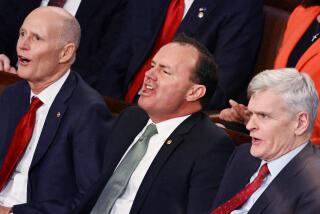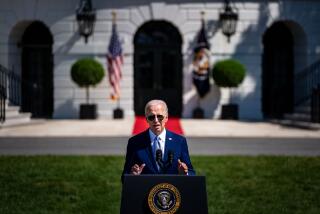Bentsen Vows to Keep Health Care Surtax : He Says Only Wealthy Oppose New Catastrophic Illness Coverage
- Share via
WASHINGTON — Accusing wealthy retired people of seeking Medicare subsidies from other taxpayers, Sen. Lloyd Bentsen, chairman of the Senate Finance Committee, stood firm Wednesday against changes in a new surtax imposed to provide protection against costs of catastrophic illness.
The Texas Democrat said that only a “vocal minority” is protesting the surtax that took effect Jan. 1 for an estimated 40% of Medicare beneficiaries who earn enough to pay federal income taxes of $150 or more.
As head of the finance panel, Bentsen is in a key position to stop any revision of the measure that was adopted last summer by overwhelming margins in both houses of Congress, signed by President Reagan and endorsed by President-elect Bush.
‘Want to Be Subsidized’
Referring to criticism of the way the new catastrophic care coverage is being financed, Bentsen told reporters: “What you’re looking at is wealthier people who don’t want to pay additional premiums (the surtax) and want to be subsidized by the rest of the taxpayers.”
When asked if he is concerned that a rising tide of protest would force repeal or revision of the new tax, he replied: “I don’t think that’s going to happen.”
If his committee hears testimony at all on the issue, he said, it would be to explain the provisions of the law rather than to consider changing it.
Even as Bentsen spoke, however, petitions requesting immediate House hearings on the new Medicare catastrophic care coverage were signed by 58 members of Congress, including House Minority Leader Robert H. Michel (R-Ill.).
Mail and telephone calls also have poured into Capitol Hill on the issue. Although the powerful committee chairman stands as a formidable obstacle to any change, such organized protests occasionally in the past have persuaded Congress to reconsider a major program.
Rep. Dan Rostenkowski (D-Ill.), chairman of the Ways and Means Committee, has taken an even tougher stand against changes in the program, opposing any congressional hearings that would give opponents a national forum to air their protests.
Cites Outcry in 1965
Bentsen argued that a similar outcry was heard after the passage of Medicare in 1965 but now that program is almost universally accepted.
While some elderly people contend that they could buy private insurance for less to give the same protection against the costs of a catastrophic illness, Bentsen said this is not true for most people.
“It’s the best buy in town,” he said of the new government program. “There’s nothing in the private sector that offers what it offers at those prices.”
The major share of the cost will come from a surtax on anyone eligible for Medicare whose income is high enough to pay at least $150 a year in federal income tax. In 1989, the surtax will be 15%, rising to 25% in 1990 and climbing by as much as 1 percentage point a year after that.
About 40% of those 65 and over will pay a surtax on 1989 income, congressional tax experts have estimated. The maximum surtax is $800 this year for an individual and $1,600 for a couple. It will go up to $1,050 for an individual and $2,100 for a couple by 1993.
More to Read
Sign up for Essential California
The most important California stories and recommendations in your inbox every morning.
You may occasionally receive promotional content from the Los Angeles Times.










